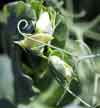Insecticide loss would hit pea and bean quality, says PGRO

Pea and bean yields and quality would be seriously affected if European Parliament amendments to new EU pesticides approval legislation are adopted, the Processors and Growers Research Organisation says.
The main impact on UK pea and bean production would be the loss of the most effective insecticides, it says in a new report on the impact of replacing the current approvals directive.
Amendments to the text agreed by EU agriculture ministers and proposed by Hiltrud Breyer, the German Green MEP, to the European Parliament’s environment committee call for any substance considered toxic to bees to not be approved.
That would result in the withdrawal of all pyrethroid insecticides, pirimicarb and chlorpyrifos, according to a Pesticides Safety Directorate impact assessment.
Pea aphid, pea and bean weevil and pea moth are all controlled largely by pyrethroid sprays and pirimicarb, PGRO says. “Pea and bean aphids cause significant losses if not controlled. Pea moth is significant because of contamination of peas grown for human consumption. Pea aphids can reduce yields by up to 40% and transmit viruses.”
Bean seed beetles are a major pest of field and broad beans, the report continues. “Pyrethroids are the only insecticides available for control at the present time.”
Some of these pests could be controlled by another class of insecticides, the neonicotinoids, the report acknowledges. “But the future of these is also in doubt.”
The loss of the actives would seriously affect the quality of peas and beans, PGRO notes. “As most of the crop is grown for premium, high-quality markets, the presence of damage or blemish would significantly reduce the viability of the UK pea and bean crop.”
In addition to the loss of insecticides, the removal of the weed-killer pendimethalin, as appears likely under the introduction of cut-off criteria proposed by the European Commission, would cause problems with weed control in certain crops.
The product is widely used addition to pre-emergence herbicides to widen the spectrum of weeks that can be controlled. “While other herbicides will remain available, a lower level of weed control will be achieved, with corresponding risks of yield loss and produce contaminants, such as potato and black nightshade berries,” the report concludes.
